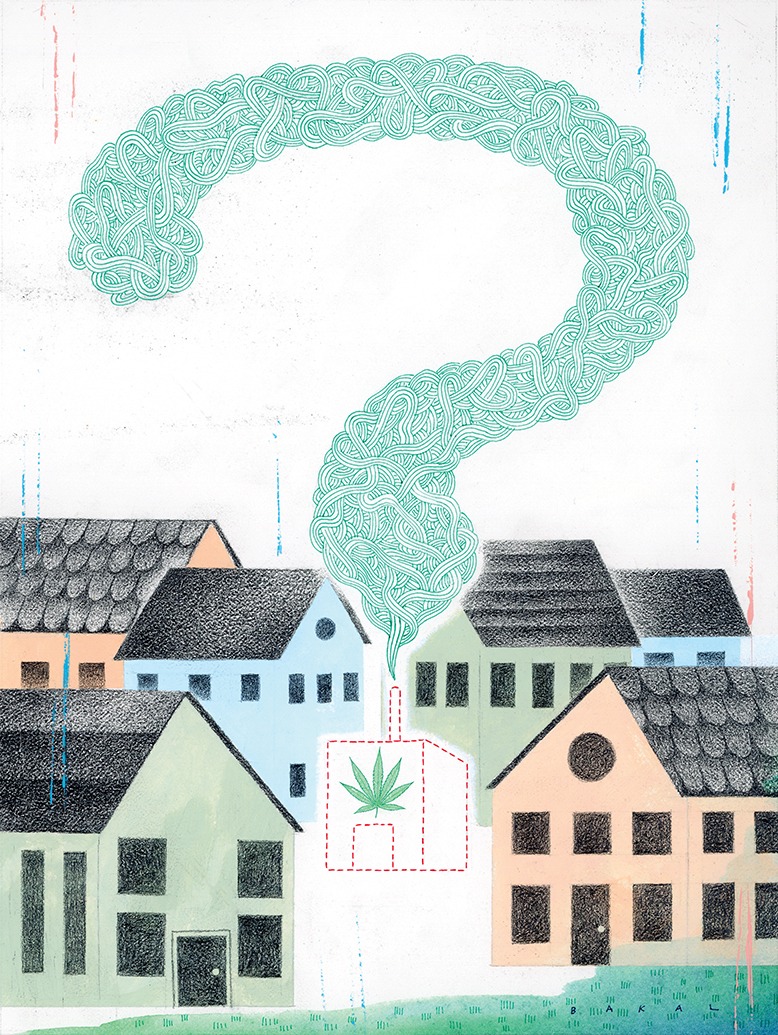
Illustration by Scott Bakal
Lacey Township Mayor Peter Curatolo doesn’t want his town to become a pot pit-stop when recreational dispensaries start opening up around New Jersey later this year.
Although 64 percent of Lacey’s residents voted last year to legalize recreational marijuana across the Garden State, many do not approve of its sale or cultivation in their community, leading the Ocean County township to opt out of allowing shops and other cannabis-related businesses to operate there in the near future, Curatolo says. “If we had chosen to opt in, our Parkway exit would be a pot destination,” he says. “I don’t badmouth the product or the people who grow it, but it’s best sold somewhere else. My job as mayor is to look out for the health and safety of our town.”
Nearly 71 percent of New Jersey communities—or about 400 towns—will not allow cannabis businesses in their municipalities, according to a USA Today Network analysis of marijuana ordinances, with some mayors saying they will take a wait-and-see approach as operations begin in the coming months.
WHY SAY NO (FOR NOW)?
The issue of dispensaries has sparked discussion and, often, controversy in towns all over the state. New Jersey voters approved legislation, by a margin of 2 to 1, last year to legalize recreational pot, yet a large number of individual towns were hesitant to allow weed so close to home.
Communities had until August 2021 to decide whether to allow cannabis businesses—including dispensaries, where adults 21 and over would be able to buy an ounce of marijuana. Many towns held off on making a decision until the last minute, when the Cannabis Regulatory Commission issued its rules describing how the operations would work.
In Lacey, the town’s governing body based its decision to opt out on residents’ concerns, as well as advice from the Ocean County sheriff, the town police chief, the Board of County Commissioners and the school board. Curatolo understands the issues well; he had been the Ocean County Health Department coordinator and the Ocean County Intoxicated Driver Resource Center director. “We don’t want to see increased DUI, increased addiction and gangs on the street,” he says.
Another factor for local leaders: Any town that opted in was locked into that decision for five years, while a community that opted out could later change its mind. Livingston Mayor Shawn Klein says that while his town opted out because “there was a tremendous amount of apprehension and concern about children,” he hasn’t shut the door. In the future, the Essex County town might entertain the prospect of growing, manufacturing and selling cannabis at an empty indoor facility, where the general public wouldn’t be affected. Klein says he doesn’t want to say a blanket no to legal, viable businesses, when tax money could help lower property taxes.
So Livingston’s leaders will sit back, wait and watch what others do this year. “We can benefit from what towns with dispensaries learn,” Klein says. “We need time to see that towns’ dispensaries don’t cause problems for kids.”
GROWING OPPORTUNITY
Legalization has created opportunities for both new and growing businesses, which can apply for six types of licenses—with retail sales attracting the most interest. Towns with ample room in warehouses or outdoor areas may attract cannabis growers. Licenses are also available for cannabis manufacturing (the making of cannabis products), distribution (transporting cannabis items between cultivators and manufacturers and selling them to a retail store), delivery (transporting a purchase from retailer to consumer) and wholesale.
When dispensaries will open remains up in the air. In August, the Cannabis Regulatory Commission declared legal sales would begin in February, but a spring date is more realistic, according to John Kagia, chief knowledge officer at New Frontier Data, a data, analytics and research organization specializing in the cannabis industry. License applications for pot growers, manufacturers and testing labs opened on December 15, but applications for dispensaries are not expected to be available until March 15.
Medical-marijuana dispensaries, meanwhile, were legalized in New Jersey in 2019. The state’s 23 medical dispensaries, which are owned by 10 operators and service about 117,000 registered medical-marijuana patients, will be able to expand this year to include recreational users if they can show they have enough cannabis for their medical patients.
PLOTTING THE ISSUES
Some towns decided to opt in to the canabis business at least in part for the revenue that the 2 percent tax on dispensaries would bring. Fair criminal justice and personal and ethical issues played a part as well. In Jersey City, Mayor Steven Fulop calls the industry “an untapped resource that will serve as a great asset to our local economy and community and an opportunity to take part in a new industry.” Revenues from the tax will be evenly split to benefit public schools and to create social programs for those adversely affected by previous marijuana laws, he says.
Jersey City will allow all six classifications of cannabis operations, though the location of the businesses will be regulated, and cannabis consumption will not be permitted in any public place, indoors or outdoors. Cannabis lounges connected to dispensaries will be allowed.
Flemington is another municipality that approved marijuana dispensaries, following council discussions and after 71 percent of residents voted for legalization with little opposition at a public hearing. Betsy Driver, mayor of the Hunterdon County borough, says she hopes the two planned dispensaries will revive the town’s business district. “I don’t want to leave that tax money on the table,” Driver says. “We’re looking forward to attracting people who see a cannabis dispensary as a destination, especially since surrounding towns have opted out.”
Governor Phil Murphy and other lawmakers say social justice was their main motivation for supporting legalized recreational marijuana. Says Fulop: “A big part of the decision to opt in involves social justice, the disproportionate incarceration and arrest rate for possession of marijuana between whites and the minority population.”
A 2018 ACLU analysis found that Black New Jersey residents were arrested for pot possession at a rate that was 3.45 times higher than their white counterparts.
Adrienne Fusaro, an African-American resident of Flemington, agreed with her town’s decision to opt in. “Even if you did time 20 years before, your arrest and conviction will impact you for life, and Latinos and African-Americans are disproportionately affected,” Fusaro says. “Legalized marijuana will lead to fair criminal justice.”
Meanwhile, in Southwest Bergen County, the mayors and governing bodies in 10 small, intertwined towns—Wood-Ridge, Hasbrouck Heights, East Rutherford, Carlstadt, Wallington, Rutherford, Lyndhurst, South Hackensack, North Arlington and Moonachie—are taking a novel approach after all opting in.
The communities are working together to establish a coordinated policy regulating the cannabis industry. Retailer and delivery licenses will not be permitted within any of the municipalities, since the business districts are near residential neighborhoods, educational and recreational facilities, and other places the public frequents.
But the towns will permit cultivator, manufacturer, wholesaler and bulk-distributor licenses in industrial zones that are not near public areas—a move that could provide valuable insight for towns that, initially, just said no.
Eleanor Gilman is a frequent contributor with a special interest in health and lifestyle issues.
